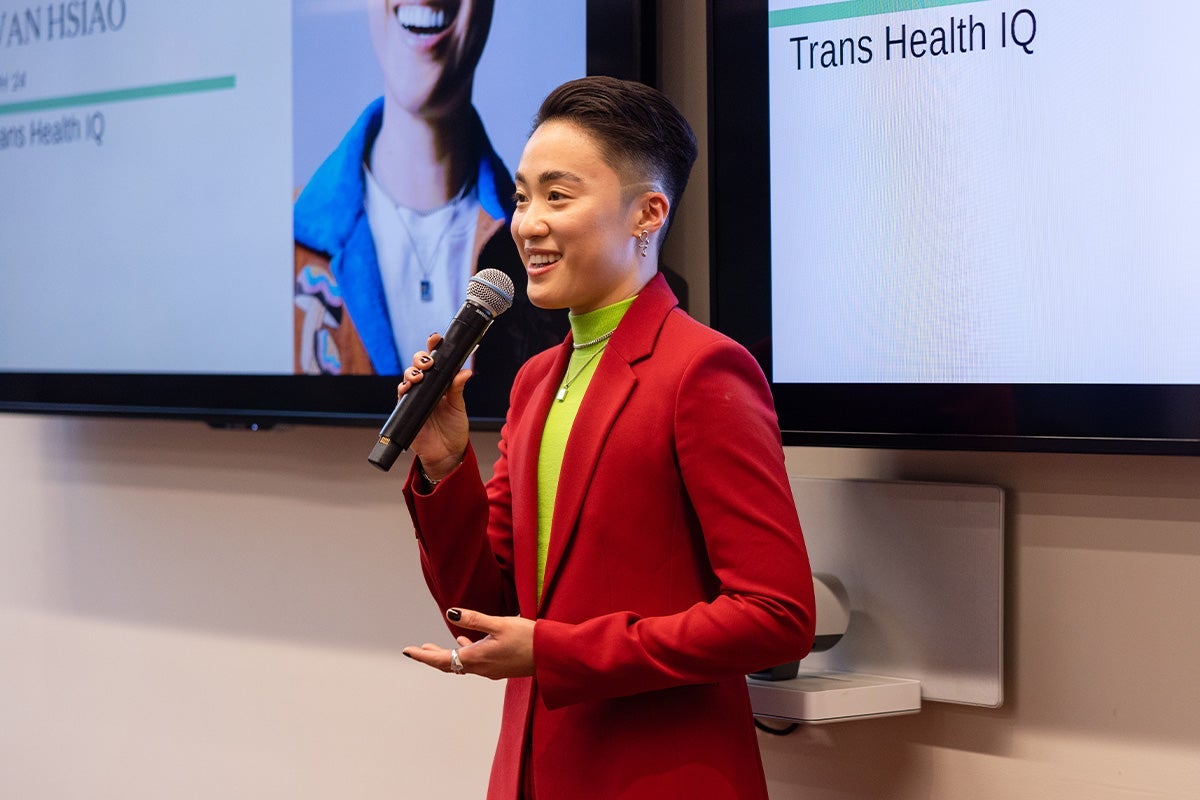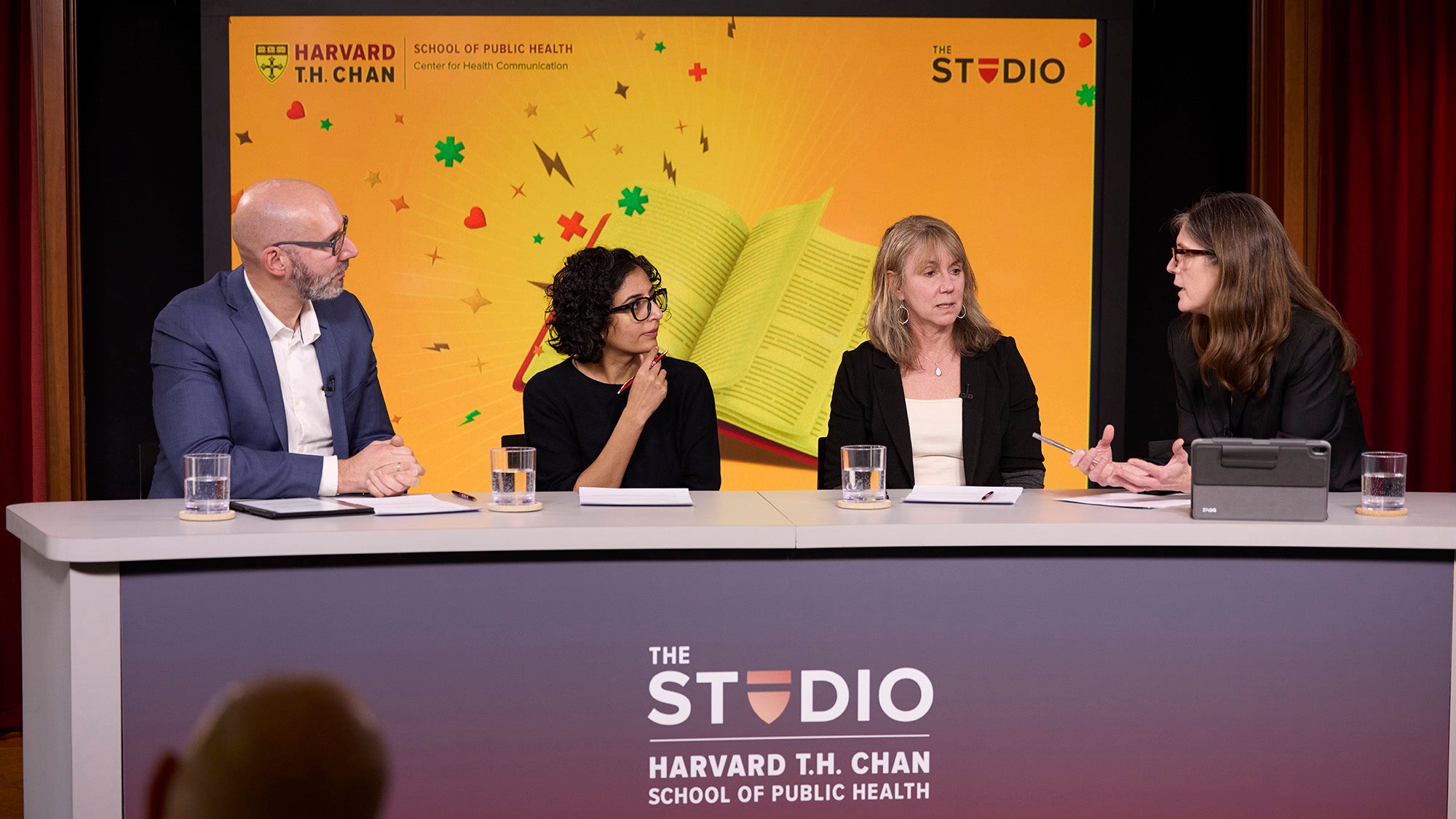Building a better system for transgender health care

Ivan Hsiao, MPH ’24, is a transgender entrepreneur who founded the startup Trans Health HQ to decrease clinicians’ barriers to providing gender-affirming care
March 7, 2024 – Since Ivan Hsiao first started to seek health care related to their gender transition, they estimate that they’ve spent over 600 hours so far in navigating the complicated process. Every step of the way, they have faced challenges including educating providers about different types of gender-affirming care—from hormone replacement therapy to routine cervical cancer screening—as well as negotiating with insurance to cover procedures.
“I had to advocate for myself,” Hsiao said. “Talking to doctors can be a really scary and vulnerable experience for anyone, and being transgender makes it more so, considering the history of discrimination in the health care setting, and our current political environment. The burden of education to receive medically necessary care should not have to fall on transgender patients.”
Hsiao’s experience is far from unique. “Every single transgender person I know has had a poor health care experience stemming from a provider negatively interacting with our transgender identity, whether it was intentional or not. That needs to change,” they said. “We all deserve medical care—it doesn’t matter if it’s related or unrelated to our transness, but it should always be delivered in alignment with it. Our community deserves better.”
To tackle these pervasive issues, Hsiao founded the startup Trans Health HQ, to provide clinicians with an one-stop shop of clinical, legal, and expert resources that allows them to optimally care and advocate for their transgender patients. In order to obtain the skills and resources to successfully launch the company, Hsiao is currently working toward an MPH degree in health and social behavior at Harvard T.H. Chan School of Public Health, with a concentration in women, gender, and health.
A winding journey
Hsiao’s educational and professional career has spanned multiple diverse fields. As an undergraduate at Columbia University, they majored in Soviet history, learned four new languages, and even attended culinary school in Paris. They also had an internship at International Medical Corps, a nonprofit that partners with local organizations to deliver medical care and supplies during humanitarian crises and build infrastructure and resilience in their aftermath.
After graduating from college, Hsiao took jobs in life sciences and health care consulting in order to gain a broad understanding of how health systems work. Starting as an analyst at IQVIA, and working their way into leadership as a manager at Blue Matter Consulting, Hsiao advised pharmaceutical and biotech companies that were producing drugs and diagnostics on efforts such as designing clinical trials and product pricing. During this time, Hsiao became particularly interested in making sure that patients actually receive the treatments they need, given the inequities in health care access in the U.S.
“Even if a drug is really efficacious, it needs to actually make it through the health system and get to the right patients,” they said. “Working in both developed and emerging markets, I was confronted daily with questions around who gets care, who determines who gets that care, and why certain populations get left behind.”
At both consulting firms, Hsiao also led diversity initiatives. For example, one of their initiatives at Blue Matter was a company-wide series of events in which they interviewed various leaders with a minority identity.
“Creating an environment where everyone is invested in creating workplace inclusivity helps all employees show up to do their best work. There is a moral imperative to support the career progression and job satisfaction of people with historically marginalized identities, but studies show that doing so can also have a positive impact on employee productivity, and thus business’ bottom line,” Hsiao said.
In addition to consulting, Hsiao served as entrepreneur-in-residence at INITIATE Studios, a venture studio—a firm that provides financial and business-building resources—supporting startups in health care innovation. There, they evaluated the viability of a startup aimed at building a diversity, equity, and inclusion software tool that tracks information such as employee demographics and sentiment, as well as equity in hiring, salaries, and promotions.
“We know from public health that without good data, we can’t identify the problem and design an appropriate solution,” Hsiao said. “Excellence in DEI requires awareness and accountability. A diagnostic and monitoring tool would enable companies to understand what benchmarks to strive for, which specific areas require intervention, and what progress has been made from baseline—at scale.”
A blueprint for better care

In the summer of 2023, shortly after founding Trans Health HQ, Hsiao began the MPH program at Harvard Chan School, where they found an ideal environment for growing the startup and made it the focus of their practicum project. Hsiao has received support as a 2023 Adrian Cheng Fellow of the New World Social Innovation Fellows Program at Harvard Kennedy School’s Social Innovation and Change Initiative (SICI); a 2024 fellow of the Harvard HealthLab Accelerator, a joint venture of Harvard Chan School and Harvard College’s Lemann Program on Creativity and Entrepreneurship; a semifinalist for the President’s Innovation Challenge; and a semifinalist in the New Venture Competition.
Hsiao hopes that Trans Health HQ helps clinicians seeking to optimize their care for transgender patients by providing an online resource and community hub with information about clinical and cultural competency when providing health care to the transgender population, the legislative landscapes of different states, and opportunities for advocacy.
Trans Health HQ, Hsiao added, can provide crucial support at a time when LGBTQ+ communities are under attack. “There are 400+ anti-LGBT bills, 100+ of which restrict gender-affirming care by making it a felony for clinicians to provide it,” Hsiao said. “These laws make it difficult for clinicians to fulfill their fiduciary duty of taking care of patients and provide scientifically-validated, medically-necessary care. These laws also perpetuate an environment where clinicians don’t receive training on how to best treat the transgender population, and are intimidated out of advocating for their trans patients.” Hsiao hopes that Trans Health HQ will support clinicians in becoming more affirming providers to trans people, and “help them continue to do what they do best: provide the most relevant, timely care for their patients.”
In addition to sharing educational resources and connecting clinicians on a permanent platform, Trans Health HQ plans to build a directory of affirming clinicians through a certification program. The certification program will enable clinicians to demonstrate their knowledge and commitment to patient-centric care. And the directory will reduce barriers for patients seeking an affirming provider.
Hsiao spoke with more than 500 clinicians and observed that they would appreciate greater clarity on what good looks like for transgender care. To provide that clarity, the certification framework will be co-created by transgender clinicians and patients, Hsiao noted.
Hsiao praises the many people—including patients, clinicians, researchers, and advocates—who have already made significant progress around improving health care for the transgender population, while acknowledging the need for greater coordination to break down silos and increase collaborations.
“We are collaborating on a 3,000-piece puzzle set where everyone’s making good progress on select areas, but each group working on a cluster hasn’t necessarily seen the box with the big picture of what exactly we are building towards,” they explained. “That’s what Trans Health HQ is meant to be—a platform to amplify all this good work that has already been accomplished, and ensure that we move towards our goal of gender health equity as one team, as efficiently as possible. Systems-level change is crucial, because transgender people’s lives are at stake.”
“Ivan has an unrelenting commitment and nuanced approach to ensuring that trans patients get access to the medical care that most people in the U.S. take as a given,” said Brittany Butler, SICI executive director and Hsiao’s practicum preceptor. “Ivan knows that our medical systems will not change overnight, and yet their clarity and conviction make quality health care for the trans community seem like an obvious eventuality. This is what the most powerful changemakers do—they bring the future closer and make it feel tangible for the rest of us.”
A ‘base camp’ for support
Hsiao credited several of their professors—Sabra Katz-Wise, Nancy Krieger, and Sari Reisner—with providing them with a crucial foundation in academic research, gender analysis, and epidemiology.
Among the many opportunities for professional growth Hsiao has found at Harvard, they said the Cheng Fellowship in particular has provided practical support and feedback for their startup. Hsiao said they’ve learned about important skills such as how to identify and mitigate unintended consequences, and measure social impact.
On a more personal level, Hsiao said that their work on Trans Health HQ is intertwined with their own gender identity. This echoes a challenge Hsiao faced in their previous DEI-related work. “To build a better health care system for my community, I show up to work with my transness front and center, which is powerful and fulfilling,” they said. “However, not everyone in the healthcare and entrepreneurial ecosystem is supportive of trans folks accessing medically necessary care, and rejections in the professional setting often carry a potent personal sting.”
Hsiao draws support from the Harvard Chan School community. “It feels like a base camp for me to return to, in order to keep climbing this mountain,” they said. “I’ve found trusted professors and peers who have opened my eyes to new ways of advancing gender health equity, and supported me wholeheartedly on my entrepreneurial and academic journey. I’m able to make these social impact and scholarship contributions at Harvard, because I’ve found people who are on the same page about social justice as a public health value that is at the heart of everything that we do.”
If you are inspired to get involved in trans health equity, learn more about Trans Health HQ here and fill out this survey to get in touch with the organization.
– Jay Lau
Photos: Ally Schmaling


